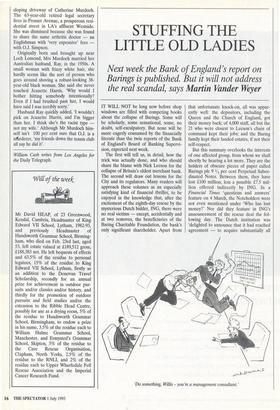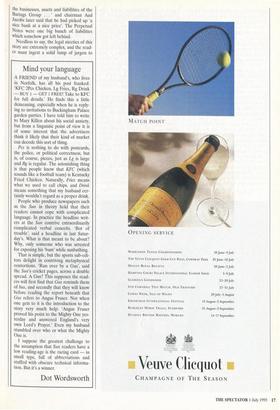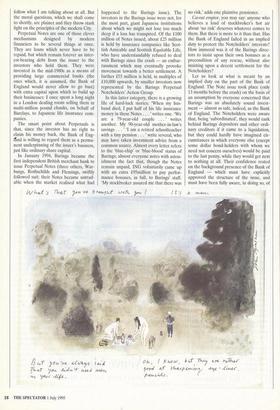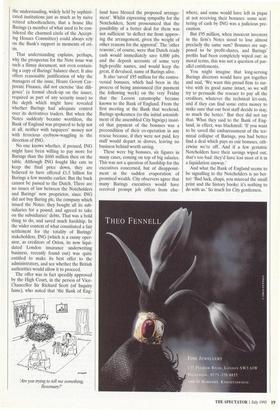STUFFING THE LITTLE OLD LADIES
Next week the Bank of England's report on Barings is published. But it will not address
the real scandal, says Martin Vander Weyer IT WILL NOT be long now before shop windows are filled with competing books about the collapse of Barings. Some will be scholarly, some sensational, some, no doubt, self-exculpatory. But none will be more eagerly consumed by the financially literate than the twin reports of the Bank of England's Board of Banking Supervi- sion, expected next week.
The first will tell us, in detail, how the trick was actually done, and who should share the blame with Nick Leeson for the collapse of Britain's oldest merchant bank. The second will draw out lessons for the City and its regulators. Many readers will approach these volumes as an especially satisfying kind of financial thriller, to be enjoyed in the knowledge that, after the excitement of the eighth-day rescue by the mysterious Dutch bidder, ING, there were no real victims — except, accidentally and at two removes, the beneficiaries of the Baring Charitable Foundation, the bank's only significant shareholder. Apart from that unfortunate knock-on, all was appar- ently well: the depositors, including the Queen and the Church of England, got their money back; of 4,000 staff, all but the 21 who were closest to Leeson's chain of command kept their jobs; and the Baring family kept their landed estates, if not their self-respect.
But this summary overlooks the interests of one affected group, from whom we shall shortly be hearing a lot more. They are the holders of obscure pieces of paper called Barings plc 9 1/4 per cent Perpetual Subor- dinated Notes. Between them, they have lost £100 million, less a possible £7.5 mil- lion offered indirectly by ING. In a Financial Times 'questions and answers' feature on 4 March, the Noteholders were not even mentioned under 'Who has lost money?' Nor did they feature in ING's announcement of the rescue deal the fol- lowing day. The Dutch institution was `delighted to announce that it had reached agreement — to acquire substantially all Do something, Willis - you're a management consultant.' the businesses, assets and liabilities of the Barings Group . . . ' and chairman Aad Jacobs later said that he had picked up 'a nice bank at a nice price'. The Perpetual Notes were one big bunch of liabilities which somehow got left behind.
Needless to say, the legal niceties of this story are extremely complex, and the read- er must ingest a solid lump of jargon to follow what I am talking about at all. But the moral questions, which we shall come to shortly, are plainer and they throw stark light on the principles of the modern City.
Perpetual Notes are one of those clever mechanisms designed by modern financiers to be several things at once. They are loans which never have to be repaid, but which remain forever an inter- est-bearing debt from the issuer to the investors who hold them. They were invented in the mid-1980s as a means of providing large commercial banks (the ones which, it is assumed, the Bank of England would never allow to go bust) with extra capital upon which to build up their businesses: I once spent a long night in a London dealing room selling them in multi-million pound chunks, on behalf of Barclays, to Japanese life insurance com- panies.
The smart point about Perpetuals is that, since the investor has no right to claim his money back, the Bank of Eng- And is willing to regard them as a perma- nent underpinning of the issuer's business, just like ordinary share capital.
In January 1994, Barings became the first independent British merchant bank to issue Perpetual Notes (three others, War- burgs, Rothschilds and Flemings, swiftly followed suit; their Notes became untrad- able when the market realised what had happened to the Barings issue). The investors in the Barings issue were not, for the most part, giant Japanese institutions about which we might not lose too much sleep if a loss has transpired. Of the £100 million of Notes issued, about £25 million is held by insurance companies like Scot- tish Amicable and Scottish Equitable Life, who have understandably refused to deal with Barings since the crash — an embar- rassment which may eventually provoke movement towards a better settlement. A further £55 million is held, in multiples of £10,000 upwards, by smaller investors now represented by the Barings Perpetual Noteholders' Action Group.
In this latter category, there is a growing file of hard-luck stories: 'When my hus- band died, I put half of his life insurance money in these Notes . . . ' writes one. 'We are a 79-year-old couple . . . ' writes another. My 90-year-old mother-in-law's savings . . . "I am a retired schoolteacher with a tiny pension . . . ' write several, who may have taken investment advice from a common source. Almost every letter refers to the `blue-chip' or `blue-blood' status of Barings; almost everyone notes with aston- ishment the fact that, though the Notes remain unpaid, ING voluntarily came up with an extra £95million to pay perfor- mance bonuses, in full, to Barings' staff. `My stockbroker assured me that there was no risk,' adds one plaintive pensioner.
Caveat emptor, you may say: anyone who believes a load of stockbroker's hot air about 'no risk' deserves whatever comes to them. But there is more to it than that. Has the Bank of England failed in an implied duty to protect the Noteholders' interests? How immoral was it of the Barings direc- tors to insist upon their own bonuses as a precondition of any rescue, without also insisting upon a decent settlement for the Noteholders?
Let us look at what is meant by an implied duty on the part of the Bank of England. The Note issue took place (only 13 months before the crash) on the basis of an assumption by everyone concerned that Barings was an absolutely sound invest- ment — almost as safe, indeed, as the Bank of England. The Noteholders were aware that, being 'subordinated', they would rank behind Barings depositors and other ordi- nary creditors if it came to a liquidation, but they could hardly have imagined cir- cumstances in which everyone else (except some dollar bond-holders with whom we need not concern ourselves) would be paid to the last penny, while they would get next to nothing at all. Their confidence rested on the background presence of the Bank of England — which must have explicitly approved the structure of the issue, and must have been fully aware, in doing so, of the understanding, widely held by sophisti- cated institutions just as much as by naive retired schoolteachers, that a house like Barings (a member of what used to be con- sidered the charmed circle of the Accept- ing Houses Committee) could always rely on the Bank's support in moments of cri- sis.
That understanding explains, perhaps, why the prospectus for the Note issue was such a flimsy document, not even contain- ing a copy of Barings' balance sheet. It also offers reasonable justification of why the managers of the issue, Hoare Govett Cor- porate Finance, did not exercise 'due dili- gence' (a formal check-up on the issuer, required as part of any security issue) to the depth which might have revealed whether Barings had adequate control over its derivatives traders. But when the Notes suddenly became worthless, the Bank of England was prepared to help not at all, neither with taxpayers' money nor with ferocious eyebrow-waggling in the direction of ING.
No one knows whether, if pressed, ING might have been willing to pay more for Barings than the £660 million then on the table. Although ING fought like cats to keep the final price down, they are believed to have offered £1.5 billion for Barings a few months earlier. But the buck cannot be passed to the Dutch. There are no issues of law between the Noteholders and Barings' new proprietor, since ING did not buy Baring plc, the company which issued the Notes: they bought all its sub- sidiaries for a pound, and agreed to take on the subsidiaries' debts. That was a bold thing to do, and saved much hardship. In the wider context of what constituted a fair settlement for the totality of Barings' stakeholders, ING (which is a canny oper- ator, as creditors of Orion, its now liqui- dated London insurance underwriting business, recently found out) was quite entitled to make its best offer to the administrators, and see whether the British authorities would allow it to proceed.
The offer was in fact speedily approved by the High Court, in the person of Vice- Chancellor Sir Richard Scott (of Inquiry fame), who noted that 'the Bank of Eng- Are you trying to tell me something, Rosemary?' land have blessed the proposed arrange- ment'. Whilst expressing sympathy for the Noteholders, Scott pronounced that the possibility of a better deal for them was not sufficient 'to deflect me from approv- ing the arrangement, given the weight of other reasons for the approval'. The 'other reasons', of course, were that Dutch ready cash would immediately save 4,000 jobs and the deposit accounts of some very high-profile names, and would keep the great, if devalued, name of Barings alive.
It also 'saved' £95 million for the contro- versial bonuses, which had been in the process of being announced (for payment the following week) on the very Friday that the Leeson catastrophe became known to the Bank of England. From the first meeting at the Bank that weekend, Barings spokesmen (to the initial astonish- ment of the assembled City bigwigs) insist- ed that payment of the bonuses was a precondition of their co-operation in any rescue because, if they were not paid, key staff would depart in droves, leaving no business behind worth saving.
These were big bonuses, six figures in many cases, coming on top of big salaries. This was not a question of hardship for the executives concerned, but of disappoint- ment at the sudden evaporation of promised wealth. City observers agree that many Barings executives would have received prompt job offers from else- where, and some would have left in pique at not receiving their bonuses: some scat- tering of cash by ING was a judicious pre- caution.
But £95 million, when innocent investors in the firm's Notes stood to lose almost precisely the same sum? Bonuses are sup- posed to be profit-shares, and Barings' profits had been completely wiped out: in moral terms, this was not a question of par- allel entitlements.
You might imagine that long-serving Barings directors would have got together and said, 'We want this proud firm to sur- vive with its good name intact, so we will try to persuade the rescuer to pay all the creditors, whatever the technical let-outs, and if they can find some extra money to make sure that our best staff decide to stay, so much the better.' But they did not say that. What they said to the Bank of Eng- land, in effect, was blackmail: 'If you want to be saved the embarrassment of the ter- minal collapse of Barings, you had better find a deal which pays us our bonuses, oth- erwise we're off. And if a few geriatric Noteholders have their savings wiped out, that's too bad: they'd have lost most of it in a liquidation anyway.'
And what the Bank of England seems to be signalling to the Noteholders is no bet- ter: 'Bad luck, chaps, you misread the small print and the history books: it's nothing to do with us.' So much for City gentlemen.





































































 Previous page
Previous page